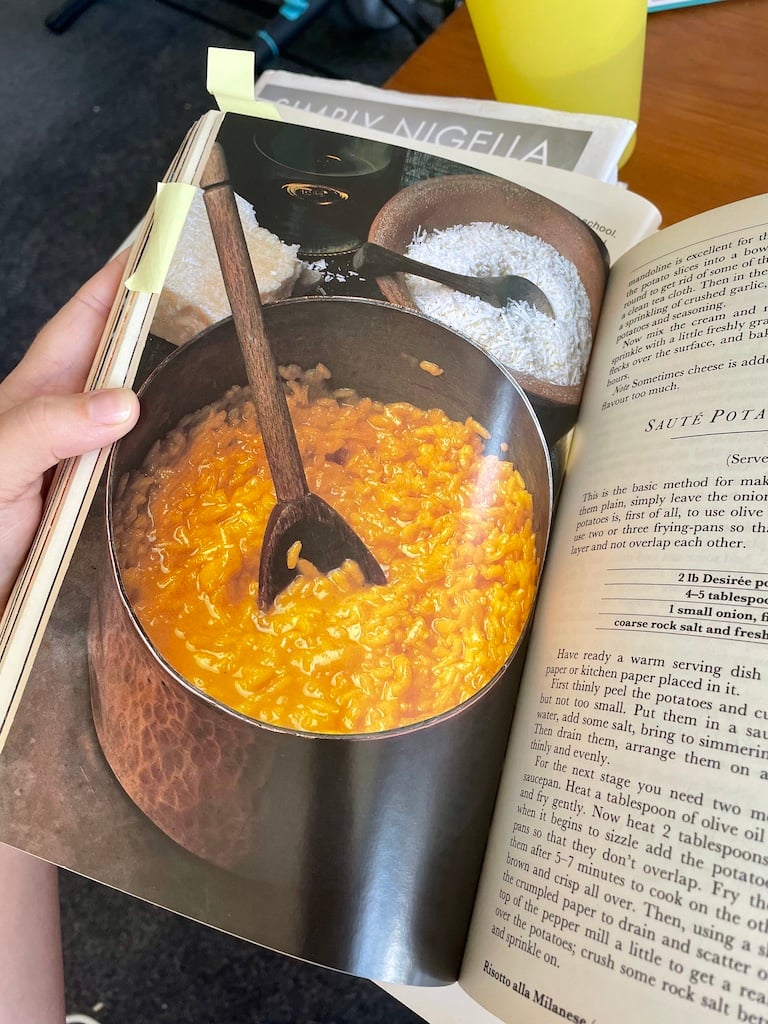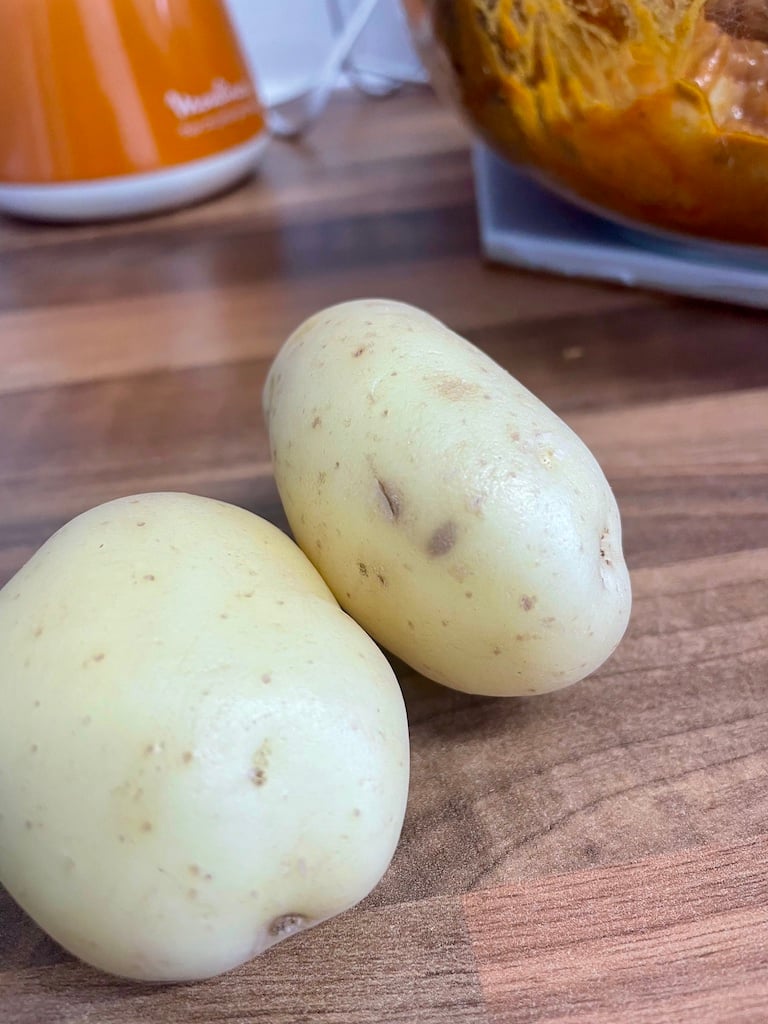The Sohla and Delia and (almost no) Nigella of it all pt 2

Idiot.
Sometimes when I’m explaining something to another person, I make them feel like an idiot.
Sometimes, when I explain things to people, it’s not because I think they don’t know, but because I’ve just found out.
Often, especially as a teenager, I was praised for a sort of dry wit - for being “so sarcastic”. Often, I didn’t know what was meant. I asked the nun and the Always promoter what pantyliners1 were for. That was so funny. It was so obvious. Because, you didn’t actually not know, right? Earnestly engaging in a desire to learn was hilarious, because you’d be an idiot not to know, and even more of an idiot to ask. You must have been taking the piss. Yeah, right. I was taking the piss. I was always taking the piss.
So, sometimes, I’ll explain things because I don’t think of what someone else might know, but what I wanted explained when the knowledge came upon me. I’ve spent considerable time figuring out how to make sense of blowing one’s nose, because sometimes you work with people who don’t know how to blow their nose. And it feels shit not being able to work out what everyone else seems to know.
But I guess it also feels shit having the basics explained to you, even if the person if just trying to give you the information they wish they had had.
So, from nose blowing (washes hands) to food preparation. I want to know…so much. Why did I chose Start Here over different (perhaps more reliable) books? (pretty, the number of recipes?) Why is my Sohla parasocial-parasocialling so hard? (pretty, the number of recent vids I’ve seen?) Why do I feel the need to document (and expose) my struggle to learn? (not just a pretty face etc etc)
Delia’s Complete Cookery Course Classic Edition is the more obvious parallel (not comparison, girls lift up girls, bitches don’t give stitches, hos before buying-into-the-misogynistic-ideal-that-all-females-are-foes) to Sohla’s Start Here, in that they are both instruction manuals, they are teaching the art and skills of cookery to novice and semi-novices. Nigella’s intros have some great emotional parallels, but first, I want to look at the obvious. I want to explain it, because I just found out, not because you’re an idiot (though…).
In the intro to Delia’s Complete Cookery Course Classic Edition (hereafter known as DCCCCE, or D4CE2) she recounts someone praising her ability to communicate reliable recipes “even for an idiot like me!”. D4CE’s response is:
“What I feel quite sure of is that problems only arise when recipes assume a lot of knowledge and experience that isn’t always there”
Delia’s approach is to look at a recipe and say: ‘oh, the vocabulary hasn’t been explained, the steps haven’t been broken down clearly enough’.
“those who are less experienced really value a comprehensive explanation”
Unfortunately, I still kind of feel like a bit of an idiot for needing it explained. And I don’t know (yet) whether that bears out in how each recipe is written3 - do I feel like one of the “less experienced” masses she is speaking to? But Delia is very explicit in this intro that she wants to show her audience what all these techniques look like. (This was so bizarre to read, as it is not what I consider a photo-rich book. There are 24 full colour pages. In a book of 640 pages overall).

There is no overt attempt to speak down to people who need a phrase or technique explained. And this is not a book to guide you to independence - this is more a reference book. It has conversion tables, subheadings, See alsos. The knowledge is front loaded to the chapter, then the recipes cascade out from there. The chapters are usually tied by an ingredient or perhaps a method, with the whole book flowing like a sort of day long feast - from eggs to puddings, preserves, and leftovers.
D4CE also does not challenge the idea that maybe some recipes simply do not work - idiot or no cooking it. That there are false prophets, grifters, people in a rush and no team to fact check and test. A trust in the establishment that seems quaint IN THESE TIMES THAT WE ARE LIVING IN.
Start Here (hereafter kno- really? Like shortening James to Jimmy. What seconds are saved?) also begins with knowing, or the expectation of knowledge. Sohla speaks of looking like she “would have done well in school”, though actually struggled quite a bit. Instead of a self-confessed idiot approaching her, Sohla effectively (affectively? jk jk) places herself in that position. Although perhaps heartwarming, it is not exactly reassuring for the student (“we’re all on this journey together, guys!”).
“Blindly memorizing state capitals or the steps to making rice pilaf doesn’t work for me; it feels like trying to retain sentences in a language I don’t speak”
Sohla’s approach is more: ‘you can tell me how a thousand times, in the simplest way, and I am just still not going to get it’.
Sohla says she needs the “context”
“I needed to learn the whys, so I could confidently figure out the hows and whats”
In mentioning some of those whys in the intro (describing why to parch rice, laminate pasta dough, bloom gelatine etc) I am quite quickly reassured of not only her credentials, but her ability to teach me. She will explain things to me, and I don’t need to feel like an idiot for not knowing something so obvious - she didn’t get it either.
Whatever is true, I get the impression from reading the intro that Sohla had spent years using cookbooks (or working for chefs) with similar outlooks to D4CE. Instructions explained again and again, broken down into smaller steps, and it worked, it kept working, just enough for her to get by. But she might still have felt like an idiot. It would still be a book to be taken out, a recipe to be worked through again. A boss you needed to ask for the instructions again. No guessing, only it’s all a guess, because you can memorise and memorise, but that doesn’t mean you’ll remember all the steps, or that you’ll know that the cookies should feel soft when they’re first out of the oven, because no-one thought to write that bit on the recipe, only that they’ll take between 8-12 minutes, and you’re not sure if the oven is really at the right temperature, because you know ovens have hot spots, but not that the butter will need to cool down a bit to solidify, so you leave it until just past the point of the 12 minutes, but also, in that time you went to the toilet, or started reading, or completed some other vital but unnecessary task and they don’t feel soft any more, sure, but they are not the light golden described.4
I have been to too, too many insets and training sessions about retrieval practice and rote learning, long and short term memory, dual coding, cognitive overload. Given incredibly dry lectures about the fizzy little links that join facts to facts and allow you to apply the knowledge in practical and impractical (read test) ways, which only bore out their point, as I made few connections and can’t really remember much more than the parts I already sort of understood anyway.
So, yes, Start Here encourages those connections so essential to actually using the knowledge you have been provided with, whereas D4CE does not, which I am used to seeing as the “good” way of teaching. I am aware that in the marketing of Start Here, emphasis was placed on how much went into physical accessibility and the proper testing of recipes. That might be what audiences want now. To feel part of something inclusive and rigorous. Maybe when D4CE’s predecessor came out in the late 70’s, audiences wanted something more straightforward - a list or set of instructions to follow (something something boomers wanted an algorithm, something Gen Zs wanna write the code etc etc v funny v funny).
Somewhere in a copybook I started using for meeting notes and then quickly misplaced, there are probably such great descriptions of the methods and psychology behind all this. It has been many cycles of pedagogical understanding and curriculum frameworks and (quickly Google to find out the US does not have a national curriculum) common core expectations (?) since the two books were published. And I suppose someone with an interest in education, cooking, social history of the late 20th/early 21st centuries, and book publishing could really get deep into those topics.
Good for her.
I know I’m not an idiot. I also know that I am. I know don’t mean to treat you like an idiot. But also, I know it’s okay if you are one.
Here are some potatoes.

I’ll tell you about them another time.
Vin Diesel is in talks. ↩
Honest to goodness, flicked to a recipe to check and it said: “First prepare the kidneys by skinning them, halving them lengthways and removing the core”. I don’t about you, but even with that explanation, I think I might have to Google “kidney core”6, so… yeah, still one of the proletariat, I suppose. ↩
Apologies to any St Crem’s alumni who came to that exhibition evening in evening in sixth class and ate any of my incredibly hard, not-quite-burnt cookies. ↩
Gwyneth’s taking calls. ↩
It was capitalism all along, of course! ↩